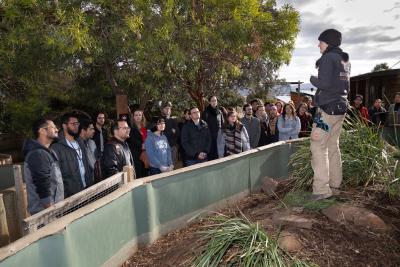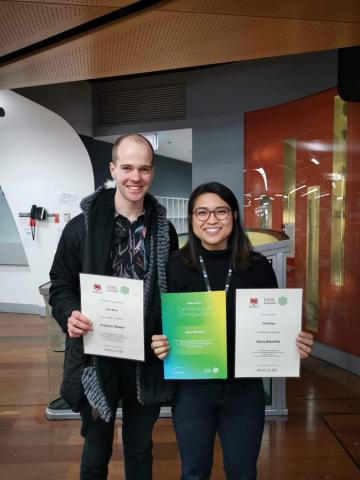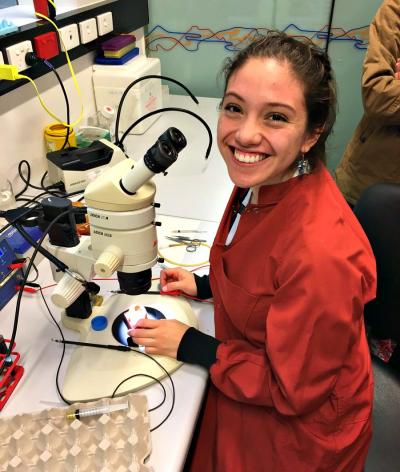The 8th EMBL Australia PhD Course
27 november – 1 december 2023, the australian national university, canberra
Around 60 first and second-year PhD students from across Australia attended the 8th annual EMBL Australia PhD Course, hosted at the John Curtin School of Medical Research at the Australian National University (ANU), Canberra, in late 2023.
It was the first year that the course returned to its traditional two-week residential format since COVID disruptions began in 2020.


The course was packed with a variety of informative seminars & lectures from around 50 leading researchers from Australia and Europe, and included training workshops and networking opportunities, such as:
- Advanced techniques in flow cytometry with Snow Fellow & EMBL Australia group leader Dr Michelle Boyle
- Imaging concepts in cellular organisation and motility with Dr Steve Lee
- Drug discovery and pre-clinical models with Dr Amee George
- Physics for Biology with Dr Richard Morris
- Three-Minute Thesis Competition
- Poster session
- Science communication lectures
- An inspiring day dedicated to ‘Creative Careers in Science’ (and open to other ANU students to attend)
One highlight of the course included a fascinating tour of Mount Stromlo Observatory, the headquarters of the renowned ANU Research School of Astronomy and Astrophysics, and a private Q&A session with ANU Vice Chancellor and Nobel Laureate Professor Brian Schmidt.
Student feedback about the PhD Course was overwhelmingly positive. PhD student Madeleine Walton-Smith said the course had been “amazing”.
“It was a very unique, collaborative experience and opportunity to see other sides of science that we wouldn’t normally be exposed to,” Ms Walton-Smith said.
“In terms of highlights for me, the astronomy and astrophysics section was incredibly eye-opening because that field of science has a very different central dogma – they publish openly, control their own journals, etc – and seeing a very successful scientist, a Nobel Laureate, speak to the difference in our fields was incredibly eye opening. The careers day was also incredibly helpful.”

Prize winners were:
- Three-Minute Thesis
- Day 1: 1st place- Nick Bariesheff, Australian National University
- Day 1: 2nd place – Lily Hayes, University of Tasmania
- Day 2: 1st place – Jack Zhang, University of New South Wales
- Day 2: 2nd place – Brooke Kinsela, Australian National University
- Poster prize – Annabel Manoleras, Monash Institute of Pharmaceutical Sciences
- Keen Bean Award (for consistent enthusiasm) – Daniel Kim, University of Sydney
- Layman Laureate (for best describing their work in layman’s terms) – Denni Currin-Ross, University of New South Wales
Our sincerest thanks to ANU and the dedicated 2023 PhD Course Organising Committee:
Richard Morris (co-Chair), Teresa Bonello (co-Chair), Eduardo Eyras, Michelle Boyle, Anna Orlov, Michael Dobbie and our student programs coordinator Ricki Mailloux.
The 7th EMBL Australia PhD Course
10 – 15 July 2022, monash university, melbourne
In July 2022, Monash University welcomed close to 50 students from across the country to participate in the 7th annual EMBL Australia PhD Course. After many months of anticipation after COVID-related restrictions delayed the course, the students gathered excitedly at the Clayton campus to learn from some of the best scientists in Australia.

The course covered topics such as:
- structural and synthetic biology
- drug discovery and delivery
- development and regeneration
- biomedical engineering
- bioinformatics/omics
- artificial intelligence
The students participated in a range of workshops and tours, including a tour of the Australian Synchrotron and the Monash Institute of Pharmaceutical Sciences.
The course also contained a variety of non-scientific talks discussing scientific integrity, career progression and social media and the life sciences.
“I really appreciated A/Prof Francine Marques’ talk concerning social media and the life sciences. Her career journey and tips to gain visibility in science are going to stick with me throughout my own scientific journey,” one attendee said.

The students also had a chance to share their research with their peers via a Three-Minute Thesis (3MT) presentation and a poster session.
Our judges had a hard time deciding winners for the 3MT and five students walked away with prizes:
- Yunan Ye, The University of Queensland, took the judges first place award on the first night of 3MT presentations, while Harrison York, from BDI Monash University, and Eamonn McKenna, from Queensland University of Technology, tied for first place on the second evening.
- Demi Georgiou, Flinders University, and Cintya Dharmayanti, University of South Australia, took away the People’s Choice Award on nights one and two respectively.
Student feedback about the course was overwhelmingly positive.
“I absolutely loved this course and will definitely be recommending it to every other PhD student! I think the course had a really nice mix of academic speakers, career/personal development, peer networking events and onsite tours. I really enjoyed how it covered such a broad range of scientific topics. Thanks for a wonderful week- it left us all feeling very inspired!” one attendee raved.
Our thanks to the 2022 PhD Course Organising Committee:
EMBL Australia alumni, Harald Janovjak, developed the course in 2021 before relocating to Flinders University. The course planning was supported by the incredible organising committee: Mikael Martino, Rob Weatheritt, Senthil Arumugam, Michelle Halls, Nadya Glebova and Ricki Mailloux.
The 6th EMBL Australia PhD Course
24 June – 5 July 2019, university of tasmania, hobart
EMBL Australia recently held its highly popular and successful PhD course in Hobart at the University of Tasmania. This year, a record number of students applied, and 60 of Australia’s top PhD students were selected to participate. It covered a wide range of topics – from epigenetics and bioinformatics to translational and clinical sciences, and exposed students to the latest ideas in molecular biology.

The program included practical workshops covering basic R-programming, bioinformatics, data-driven subgrouping, genetics, molecular biology and imaging techniques. Students participated in a Tasmanian devil themed session on one day, which included one of the highlights of the course – a visit to Bonorong Wildlife Sanctuary. Students also spent one day visiting the Australian Antarctic Division and Institute for Marine and Antarctic Studies, where they drove snow rovers that were gearing up for expeditions and participated in a virtual reality tour of penguin colonies.
“The students really enjoyed the experience. It’s been a great way for them to network with other students, learn about different areas of research and the career paths of senior researchers,” said Assoc Prof Ville-Petteri Mäkinen who is an EMBL Australia Group Leader at the South Australian Health and Medical Research Institute (SAHMRI) and was also on the 2019 PhD Course Organising Committee.
All students presented their research in three-minute thesis presentations and participated in a poster session. Mary Mandsilla was awarded first place for her poster, and Frank Olivier won first prize in the three- minute thesis competition.

“This course was an incredible academic experience. I’m truly inspired by all the research that is being conducted around me. The connections and networks that we have all built at this course will no doubt support future collaborations with each other, foster friendships and peer support with each other,” said participant Kay Myo Min.
“We arrived as 60 PhDs scattered across Australia, and left as an inspired community of young researchers,” said Frank Olivier.
Two very interesting and informative panel discussions with Q&A sessions were held on genetics and society, and also integrity and ethics. Students attended a science communication workshop, where they used a pen and paper to draw their research – a first for most students.
“It was fantastic to work with the local Tasmanian organisers from the University of Tasmania and to bring together enthusiastic students and distinguished speakers from all over the country. Indeed, the course program was an amazing cross-section of the top molecular sciences in Australia”, said Assoc Prof Ville-Petteri Mäkinen.
Isabelle Capell-Hattam was a participating student who wrote a blog post on her experience:
‘There is not a single better way I could have spent these two weeks of my PhD and I would 110% recommend ALL eligible PhD candidates apply for the future EMBL Australia PhD course- you will not be disappointed!’
Read the full blog post here.
Thanks to the 2019 PhD Course Organising Committee:
Pirjo Apaja, Michelle Boyle, Lisa Foa, Nadya Glebova, Kana Gudan, Lydia Kokotos, Ville-Petteri Mäkinen, Tanya Rogers, Phillippa Taberlay, Antoine van Oijen, Coral Warr.
The 5th EMBL Australia PhD Course
1 – 13 July 2018, UNIVERSITY OF NEW SOUTH WALES, Sydney
Sixty of the nations finest first and second-year PhD students converged at UNSW Sydney in July 2018 to participate in the annual EMBL Australia PhD course.
PhD candidates – all students of the life sciences – were selected from all over Australia to attend the two-week course that exposed them to the latest research, ranging from structural biology to animal models, developmental biology to bioinformatics, advanced microscopy to plant biology.
Inspired by the compulsory pre-doctoral training program for students at EMBL, the home-grown EMBL Australia PhD course is now in its fifth year and included tours of local state-of-the-art facilities, career insights and panel discussions, as well as networking opportunities.

Leading international scientists (including Yale University physicist Professor Joe Howard) and Australian researchers at various career stages gave rare glimpses into how scientific careers are forged, and how projects change over time – including the mistakes, failures and personal struggles that are part of most success stories but are seldom told.
“We wanted to inspire them with amazing research, but we also wanted to tell them the whole story,” said Dr Yann Gambin, one of the organisers of the PhD course and EMBL Australia group leader at UNSW’s Single Molecule Science.
Professor Kerry-Anne Rye, Deputy Head (Research) of UNSW’s School of Medical Sciences, said: “It was totally different from any talk I have given before because it required divulging some personal information before the audience could make sense of some of the decisions I took along the way.”
UNSW’s Head of School of Medical Sciences, Professor Peter Gunning, captivated the students with the evolution of an overarching project from his group that spanned over 15 years and was impressed with the lively atmosphere throughout the course.
“When an audience engages like this, it stimulates everyone in the room; you kick ideas around and explore options which otherwise would be passed by,” he said. “It does not happen all that often but when it does, there is nothing quite like it!”
Each day, a different student took over the @EMBLAustralia twitter handle to live tweet from the course using the hashtag #EMBLAPhD.
A tweet from a course participant hailing from the University of Queensland summed up the fortnight beautifully: “Thank you @EMBLAustralia for the opportunity of spending two amazing weeks knowing other (bright) PhD students Down Under! Totally mesmerised by the quality of research lead by our senior investigators and truly inspired to becoming one myself”.

Our thanks to the 2018 PhD Course Organising Committee:
- Dr Yann Gambin & Dr Abigail Pollock, EMBL Australia Node in Single Molecule Science, UNSW Sydney
- Dr Ville-Petteri Mäkinen, EMBL Australia Group Leader at the South Australian Health & Medical Research Institute
- Alex Langer & Rochelle Ades, EMBL Australia Secretariat, Monash University, Melbourne
The 4th EMBL Australia PhD Course
9 – 21 July 2017, Monash University, Melbourne

Dozens of life science leaders from across the nation – and several from across the globe – travelled to Melbourne to share their expertise with sixty hand-picked young scientists at the 4th EMBL Australia PhD Course.
The line-up of 57 presenters comprised Nobel Laureate Professor Ada Yonath and other eminent scientists, including:
- EMBL Australia Scientific Head Professor James Whisstock
- The Jackson Laboratory for Mammalian Genetics Scientific Director Professor Nadia Rosenthal
- South Australian Scientist of the Year 2016 Professor Alan Cooper
- EMBL Electron Microscopy Core Facility Head Dr Yannick Schwab
- Walter and Eliza Hall Institute Director Professor Doug Hall
- The Garvan Institute of Medical Research Director Professor John Mattick and
- The Bio21 Institute Director Professor Michael Parker.
Several presentations were also opened to the public.
Modelled on the compulsory pre-doc training program of the prestigious European Molecular Biology Laboratory (EMBL), the course covered a wide range of topics – from epigenetics and bioinformatics to translational and clinical sciences – exposing students to the latest ideas in molecular biology and infrastructure available in Australia.
Other highlights of the two-week residential program, held at Monash University between July 9 and 21, included a panel discussion with industry leaders on translating biomedical research, a tour of the Australian Synchrotron, practical workshops and a poster session where students shared their own research with their peers.
Social events assisted the first and second-year PhD students in developing their network of scientific contacts and forging relationships for future collaborations.
Several students also volunteered to guest tweet on the EMBL Australia Twitter account, at one point propelling the course hashtag (#EMBLAPhD) into the top ten trending topics in Australia.
The calibre of presenters at the course was a testament to the hard work of the group leaders on the Organising Committee – Edwina McGlinn (Chair), Maté Biro, Chen Davidovich and Max Cryle – and student programs coordinator Paul Jones.
The 3rd EMBL Australia PhD Course
22 June – 3 July 2015, Harry Perkins Institute of Medical Research, Perth
Th third EMBL Australia PhD course at the Harry Perkins Institute, attended by 59 of our PhD students, was met with much excitement and proved to be a triumph once again.
The course was a highlight of the EMBL Australia calendar, for students and presenters alike. It was the ideal platform for our PhD students to network, learn new techniques, and expand their scientific knowledge.
This year’s guest speakers were extraordinary, motivating the students to think more laterally and encouraging them to consider how their scientific research fits in globally. We attracted an amazing contingent of well-known presenters, both locally and from overseas. We even had two Group Leaders from EMBL Monterotondo join us. Dr Cornelius Gross delivered seminars in neurobiology and RNA regulation and gave two stimulating presentations on his research, “Gardeners of the brain: how microglia prune synapses during development” and “Primal threats: the neural circuity of social and predator fear”. Dr Donal O’Carroll also shared his exciting work in RNA function in germ and stem cell biology and gave a dynamic presentation entitled “Cell programming In-Focus: Understanding spermatogonial stem cell dynamics in homeostasis and regeneration”.
We are truly grateful to all the speakers for making their time and knowledge available to our students and for their ongoing enthusiastic support of EMBL Australia in such an intimate setting. It was inspiring to see how much our students grasped the opportunities created for them at the course, and to watch them interact with their peers and share insights and knowledge with such vitality. Many students commented on how they had identified opportunities for collaboration – the perfect outcome! We would like to thank all the speakers for committing their time, their stimulating presentations and for inspiring our students and making this year’s course such a success.
Thank you to the organising committee, Dr Archa Fox, Dr Louise Winteringham, Dr Joshua Mylne, Ms Rosie Goldup, Ms Meredith Eddington and the Harry Perkins Institute for warmly hosting this year’s successful course.